- Home
- Henry James
The Princess Casamassima Page 7
The Princess Casamassima Read online
Page 7
‘Lord, I suppose so,’ murmured Miss Pynsent; while her visitor went on to say that the unfortunate person on whose behalf she had undertaken this solemn pilgrimage might live a week and might live a fortnight, but if she lived a month, would violate (as Mrs Bowerbank might express herself) every established law of nature, being reduced to skin and bone, with nothing left of her but the main desire to see her child.
‘If you’re afraid of her talking, it isn’t much she’d be able to say. And we shouldn’t allow you more than about eight minutes,’ Mrs Bowerbank pursued, in a tone that seemed to refer itself to an iron discipline.
‘I’m sure I shouldn’t want more; that would be enough to last me many a year,’ said Miss Pynsent, accommodatingly. And then she added, with another illumination, ‘Don’t you think he might throw it up against me that I did take him? People might tell him about her in later years; but if he hadn’t seen her he wouldn’t be obliged to believe them.’
Mrs Bowerbank considered this a moment, as if it were rather a super-subtle argument, and then answered, quite in the spirit of her official pessimism, ‘There is one thing you may be sure of: whatever you decide to do, as soon as ever he grows up he will make you wish you had done the opposite.’ Mrs Bowerbank called it opposite.
‘Oh, dear, then, I’m glad it will be a long time.’
‘It will be ever so long, if once he gets it into his head! At any rate, you must do as you think best. Only, if you come, you mustn’t come when it’s all over.’
‘It’s too impossible to decide.’
‘It is, indeed,’ said Mrs Bowerbank, with superior consistency. And she seemed more placidly grim than ever when she remarked, gathering up her loosened shawl, that she was much obliged to Miss Pynsent for her civility, and had been quite freshened up: her visit had so completely deprived her hostess of that sort of calm. Miss Pynsent gave the fullest expression to her perplexity in the supreme exclamation:
‘If you could only wait and see the child, I’m sure it would help you to judge!’
‘My dear woman, I don’t want to judge – it’s none of our business!’ Mrs Bowerbank exclaimed; and she had no sooner uttered the words than the door of the room creaked open and a small boy stood there gazing at her. Her eyes rested on him a moment, and then, most unexpectedly, she gave an inconsequent cry. ‘Is that the child? Oh, Lord o’ mercy, don’t take him!’
‘Now ain’t he shrinking and sensitive?’ demanded Miss Pynsent, who had pounced upon him, and, holding him an instant at arm’s length, appealed eagerly to her visitor. ‘Ain’t he delicate and high-bred, and wouldn’t he be thrown into a state?’ Delicate as he might be the little dressmaker shook him smartly for his naughtiness in being out of the way when he was wanted, and brought him to the big, square-faced, deep-voiced lady who took up, as it were, all that side of the room. But Mrs Bowerbank laid no hand upon him; she only dropped her gaze from a tremendous height, and her forbearance seemed a tribute to that fragility of constitution on which Miss Pynsent desired to insist, just as her continued gravity was an implication that this scrupulous woman might well not know what to do.
‘Speak to the lady nicely, and tell her you are very sorry to have kept her waiting.’
The child hesitated a moment, while he reciprocated Mrs Bowerbank’s inspection, and then he said, with a strange, cool conscious indifference (Miss Pynsent instantly recognised it as his aristocratic manner), ‘I don’t think she can have been in a very great hurry.’
There was irony in the words, for it is a remarkable fact that even at the age of ten Hyacinth Robinson was ironical; but the subject of his allusion, who was not nimble withal, appeared not to interpret it; so that she rejoined only by remarking, over his head, to Miss Pynsent, ‘It’s the very face of her over again!’
‘Of her? But what do you say to Lord Frederick?’
‘I have seen lords that wasn’t so dainty!’
Miss Pynsent had seen very few lords, but she entered, with a passionate thrill, into this generalisation; controlling herself, however, for she remembered the child was tremendously sharp, sufficiently to declare, in an edifying tone, that he would look more like what he ought to if his face were a little cleaner.
‘It was probably Millicent Henning dirtied my face when she kissed me,’ the boy announced, with slow gravity, looking all the while at Mrs Bowerbank. He exhibited not a symptom of shyness.
‘Millicent Henning is a very bad little girl; she’ll come to no good,’ said Miss Pynsent, with familiar decision, and also, considering that the young lady in question had been her effective messenger, with marked ingratitude.
Against this qualification the child instantly protested. ‘Why is she bad? I don’t think she is bad; I like her very much.’ It came over him that he had too hastily shifted to her shoulders the responsibility of his unseemly appearance, and he wished to make up to her for that betrayal. He dimly felt that nothing but that particular accusation could have pushed him to it, for he hated people who were not fresh, who had smutches and streaks. Millicent Henning generally had two or three, which she borrowed from her doll, into whom she was always rubbing her nose and whose dinginess was contagious. It was quite inevitable she should have left her mark under his own nose when she claimed her reward for coming to tell him about the lady who wanted him.
Miss Pynsent held the boy against her knee, trying to present him so that Mrs Bowerbank should agree with her about his having the air of race.11 He was exceedingly diminutive, even for his years, and though his appearance was not positively sickly it seemed written in his attenuated little person that he would never be either tall or strong. His dark blue eyes were separated by a wide interval, which increased the fairness and sweetness of his face, and his abundant curly hair, which grew thick and long, had the golden brownness predestined to elicit exclamations of delight from ladies when they take the inventory of a child. His features were smooth and pretty; his head was set upon a slim little neck; his expression, grave and clear, showed a quick perception as well as a great credulity; and he was altogether, in his innocent smallness, a refined and interesting figure.
‘Yes, he’s one that would be sure to remember,’ said Mrs Bowerbank, mentally contrasting him with the undeveloped members of her own brood, who had never been retentive of anything but the halfpence which they occasionally contrived to filch from her. Her eyes descended to the details of his toilet: the careful mending of his short breeches and his long, coloured stockings, which she was in a position to appreciate, as well as the knot of bright ribbon which the dressmaker had passed into his collar, slightly crumpled by Miss Henning’s embrace. Of course Miss Pynsent had only one to look after, but her visitor was obliged to recognise that she had the highest standard in respect to buttons. ‘And you do turn him out so it’s a pleasure,’ she went on, noting the ingenious patches in the child’s shoes, which, to her mind, were repaired for all the world like those of a little nobleman.
‘I’m sure you’re very civil,’ said Miss Pynsent, in a state of severe exaltation. ‘There’s never a needle but mine has come near him. That’s exactly what I think: the impression would go so deep.’
‘Do you want to see me only to look at me?’ Hyacinth inquired, with a candour which, though unstudied, had again much of the force of satire.
‘I’m sure it’s very kind of the lady to notice you at all!’ cried his protectress, giving him an ineffectual jerk. ‘You’re no bigger than a flea; there are many that wouldn’t spy you out.’
‘You’ll find he’s big enough, I expect, when he begins to go,’ Mrs Bowerbank remarked, tranquilly; and she added that now she saw how he was turned out she couldn’t but feel that the other side was to be considered. In her effort to be discreet, on account of his being present (and so precociously attentive), she became slightly enigmatical; but Miss Pynsent gathered her meaning, which was that it was very true the child would take everything in and keep it: but at the same time it was precisely his being so attractive tha
t made it a kind of sin not to gratify the poor woman, who, if she knew what he looked like to-day, wouldn’t forgive his adoptive mamma for not producing him. ‘Certainly, in her place, I should go off easier if I had seen them curls,’ Mrs Bowerbank declared, with a flight of maternal imagination which brought her to her feet, while Miss Pynsent felt that she was leaving her dreadfully ploughed up, and without any really fertilising seed having been sown. The little dressmaker packed the child upstairs to tidy himself for his tea, and while she accompanied her visitor to the door told her that if she would have a little more patience with her she would think a day or two longer what was best and write to her when she should have decided. Mrs Bowerbank continued to move in a realm superior to poor Miss Pynsent’s vacillations and timidities, and her impartiality gave her hostess a high idea of her respectability; but the way was a little smoothed when, after Amanda had moaned once more, on the threshold, helplessly and irrelevantly, ‘Ain’t it a pity she’s so bad?’ the ponderous lady from the prison rejoined, in those tones which seemed meant to resound through corridors of stone, ‘I assure you there’s a many that’s much worse!’
2
Miss Pynsent, when she found herself alone, felt that she was really quite upside down; for the event that had just occurred had never entered into her calculations: the very nature of the case had seemed to preclude it. All she knew, and all she wished to know, was that in one of the dreadful institutions constructed for such purposes her quondam comrade was serving out the sentence that had been substituted for the other (the unspeakable horror) almost when the halter was already round her neck. As there was no question of that concession being stretched any further, poor Florentine seemed only a little more dead than other people, having no decent tombstone to mark the place where she lay. Miss Pynsent had therefore never thought of her dying again; she had no idea to what prison she had been committed on being removed from Newgate12 (she wished to keep her mind a blank about the matter, in the interest of the child), and it could not occur to her that out of such silence and darkness a second voice would reach her, especially a voice that she should really have to listen to. Miss Pynsent would have said, before Mrs Bowerbank’s visit, that she had no account to render to any one; that she had taken up the child (who might have starved in the gutter) out of charity, and had brought him up, poor and precarious as her own subsistence had been, without a penny’s help from another source; that the mother had forfeited every right and title; and that this had been understood between them – if anything, in so dreadful an hour, could have been said to be understood – when she went to see her at Newgate (that terrible episode, nine years before, overshadowed all Miss Pynsent’s other memories) : went to see her because Florentine had sent for her (a name, face and address coming up out of the still recent but sharply separated past of their working-girl years), as the one friend to whom she could appeal with some chance of a pitying answer. The effect of violent emotion, with Miss Pynsent, was not to make her sit with idle hands or fidget about to no purpose; under its influence, on the contrary, she threw herself into little jobs, as a fugitive takes to by-paths, and clipped and cut, and stitched and basted, as if she were running a race with hysterics. And while her hands, her scissors, her needle flew, an infinite succession of fantastic possibilities trotted through her confused little head; she had a furious imagination, and the act of reflection, in her mind, was always a panorama of figures and scenes. She had had her picture of the future, painted in rather rosy hues, hung up before her now for a good many years; but it seemed to her that Mrs Bowerbank’s heavy hand had suddenly punched a hole in the canvas. It must be added, however, that if Amanda’s thoughts were apt to be bewildering visions they sometimes led her to make up her mind, and on this particular September evening she arrived at a momentous decision. What she made up her mind to was to take advice, and in pursuance of this view she rushed downstairs, and, jerking Hyacinth away from his simple but unfinished repast, packed him across the street to tell Mr Vetch (if he had not yet started for the theatre) that she begged he would come in to see her when he came home that night, as she had something very particular she wished to say to him. It didn’t matter if he should be very late, he could come in at any hour – he would see her light in the window – and he would do her a real mercy. Miss Pynsent knew it would be of no use for her to go to bed; she felt as if she should never close her eyes again. Mr Vetch was her most distinguished friend; she had an immense appreciation of his cleverness and knowledge of the world, as well as of the purity of his taste in matters of conduct and opinion; and she had already consulted him about Hyacinth’s education. The boy needed no urging to go on such an errand, for he, too, had his ideas about the little fiddler, the second violin in the orchestra of the Bloomsbury Theatre.13 Mr Vetch had once obtained for the pair an order for two seats at a pantomime, and for Hyacinth the impression of that ecstatic evening had consecrated him, placed him for ever in the golden glow of the footlights. There were things in life of which, even at the age of ten, it was a conviction of the boy’s that it would be his fate never to see enough, and one of them was the wonder-world illuminated by those playhouse lamps. But there would be chances, perhaps, if one didn’t lose sight of Mr Vetch; he might open the door again; he was a privileged, magical mortal, who went to the play every night.
He came in to see Miss Pynsent about midnight; as soon as she heard the lame tinkle of the bell she went to the door to let him in. He was an original, in the fullest sense of the word: a lonely, disappointed, embittered, cynical little man, whose musical organisation had been sterile, who had the nerves, the sensibilities, of a gentleman, and whose fate had condemned him, for the last ten years, to play a fiddle at a second-rate theatre for a few shillings a week. He had ideas of his own about everything, and they were not always very improving. For Amanda Pynsent he represented art, literature (the literature of the play-bill), and philosophy, and she always felt about him as if he belonged to a higher social sphere, though his earnings were hardly greater than her own and he lived in a single back-room, in a house where she had never seen a window washed. He had, for her, the glamour of reduced gentility and fallen fortunes; she was conscious that he spoke a different language (though she couldn’t have said in what the difference consisted) from the other members of her humble, almost suburban circle; and the shape of his hands was distinctly aristocratic. (Miss Pynsent, as I have intimated, was immensely preoccupied with that element in life.) Mr Vetch displeased her only by one of the facets of his character—his blasphemous republican, radical views, and the contemptuous manner in which he expressed himself about the nobility. On that ground he worried her extremely, though he never seemed to her so clever as when he horrified her most. These dreadful theories (expressed so brilliantly that, really, they might have been dangerous if Miss Pynsent had not known her own place so well) constituted no presumption against his refined origin; they were explained, rather, to a certain extent, by a just resentment at finding himself excluded from his proper place. Mr Vetch was short, fat and bald, though he was not much older than Miss Pynsent, who was not much older than some people who called themselves forty-five; he always went to the theatre in evening-dress, with a flower in his button-hole, and wore a glass in one eye.14 He looked placid and genial, and as if he would fidget at the most about the ‘get up’ of his linen;15 you would have thought him finical but superficial, and never have suspected that he was a revolutionist, or even a critic of life. Sometimes, when he could get away from the theatre early enough, he went with a pianist, a friend of his, to play dance-music at small parties; and after such expeditions he was particularly cynical and startling; he indulged in diatribes against the British middle-class, its Philistinism, its snobbery. He seldom had much conversation with Miss Pynsent without telling her that she had the intellectual outlook of a caterpillar; but this was his privilege after a friendship now of seven years’ standing, which had begun (the year after he came to live in Lomax Place) with her goi
ng over to nurse him, on learning from the milkwoman that he was alone at Number 17 – laid up with an attack of gastritis. He always compared her to an insect or a bird, and she didn’t mind, because she knew he liked her, and she herself liked all winged creatures. How indeed could she complain, after hearing him call the Queen a superannuated form and the Archbishop of Canterbury a grotesque superstition?
He laid his violin-case on the table, which was covered with a confusion of fashion-plates and pincushions, and glanced toward the fire, where a kettle was gently hissing. Miss Pynsent, who had put it on half an hour before, read his glance, and reflected with complacency that Mrs Bowerbank had not absolutely drained the little bottle in the cheffonier. She placed it on the table again, this time with a single glass, and told her visitor that, as a great exception, he might light his pipe. In fact, she always made the exception, and he always replied to the gracious speech by inquiring whether she supposed the greengrocers’ wives, the butchers’ daughters, for whom she worked, had fine enough noses to smell, in the garments she sent home, the fumes of his tobacco. He knew her ‘connection’ was confined to small shopkeepers, but she didn’t wish others to know it, and would have liked them to believe it was important that the poor little stuffs she made up (into very queer fashions, I am afraid) should not surprise the feminine nostril. But it had always been impossible to impose on Mr Vetch; he guessed the truth, the untrimmed truth, about everything in a moment. She was sure he would do so now, in regard to this solemn question which had come up about Hyacinth; he would see that though she was agreeably flurried at finding herself whirled in the last eddies of a case that had been so celebrated in its day, her secret wish was to shirk her duty (if it was a duty); to keep the child from ever knowing his mother’s unmentionable history, the shame that attached to his origin, the opportunity she had had of letting him see the wretched woman before she died. She knew Mr Vetch would read her troubled thoughts, but she hoped he would say they were natural and just: she reflected that as he took an interest in Hyacinth he wouldn’t desire him to be subjected to a mortification that might rankle for ever and perhaps even crush him to the earth. She related Mrs Bowerbank’s visit, while he sat upon the sofa in the very place where that majestic woman had reposed, and puffed his smoke-wreaths into the dusky little room. He knew the story of the child’s birth, had known it years before, so she had no startling revelation to make. He was not in the least agitated at learning that Florentine was dying in prison and had managed to get a message conveyed to Amanda; he thought this so much in the usual course that he said to Miss Pynsent, ‘Did you expect her to live on there for ever, working out her terrible sentence, just to spare you the annoyance of a dilemma, or any reminder of her miserable existence, which you have preferred to forget?’ That was just the sort of question Mr Vetch was sure to ask, and he inquired, further, of his dismayed hostess, whether she were sure her friend’s message (he called the unhappy creature her friend) had come to her in the regular way. The warders, surely, had no authority to introduce visitors to their captives; and was it a question of her going off to the prison on the sole authority of Mrs Bowerbank? The little dressmaker explained that this lady had merely come to sound her, Florentine had begged so hard. She had been in Mrs Bowerbank’s ward before her removal to the infirmary, where she now lay ebbing away, and she had communicated her desire to the Catholic chaplain, who had undertaken that some satisfaction – of inquiry, at least – should be given her. He had thought it best to ascertain first whether the person in charge of the child would be willing to bring him, such a course being perfectly optional, and he had some talk with Mrs Bowerbank on the subject, in which it was agreed between them that if she would approach Miss Pynsent and explain to her the situation, leaving her to do what she thought best, he would answer for it that the consent of the governor of the prison should be given to the interview. Miss Pynsent had lived for fourteen years in Lomax Place, and Florentine had never forgotten that this was her address at the time she came to her at Newgate (before her dreadful sentence had been commuted), and promised, in an outgush of pity for one whom she had known in the days of her honesty and brightness, that she would save the child, rescue it from the workhouse17 and the streets, keep it from the fate that had swallowed up the mother. Mrs Bowerbank had a half-holiday, and a sister living also in the north of London, to whom she had been for some time intending a visit; so that after her domestic duty had been performed it had been possible for her to drop in on Miss Pynsent in a natural, casual way and put the case before her. It would be just as she might be disposed to view it. She was to think it over a day or two, but not long, because the woman was so ill, and then write to Mrs Bowerbank, at the prison. If she should consent, Mrs Bowerbank would tell the chaplain, and the chaplain would obtain the order from the governor and send it to Lomax Place; after which Amanda would immediately set out with her unconscious16 victim. But should she – must she – consent? That was the terrible, the heart-shaking question, with which Miss Pynsent’s unaided wisdom had been unable to grapple.

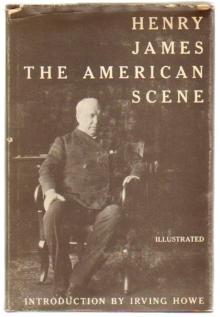 The American
The American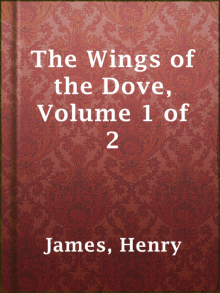 The Wings of the Dove, Volume 1 of 2
The Wings of the Dove, Volume 1 of 2 Frost at Midnight
Frost at Midnight Morning Frost
Morning Frost The Portrait of a Lady — Volume 1
The Portrait of a Lady — Volume 1 Fatal Frost
Fatal Frost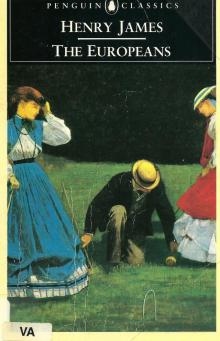 The Europeans
The Europeans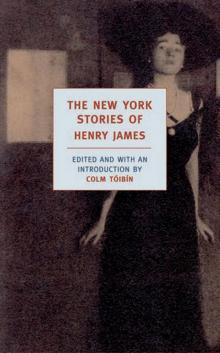 The New York Stories of Henry James
The New York Stories of Henry James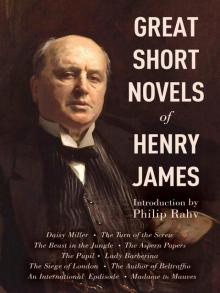 Great Short Novels of Henry James
Great Short Novels of Henry James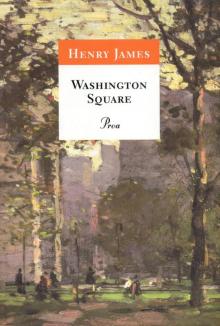 Washington Square
Washington Square The Portrait of a Lady — Volume 2
The Portrait of a Lady — Volume 2 The Ambassadors
The Ambassadors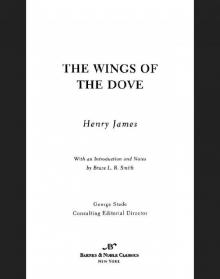 The Wings of the Dove
The Wings of the Dove The Princess Casamassima (Classics)
The Princess Casamassima (Classics) The Coxon Fund
The Coxon Fund First Frost
First Frost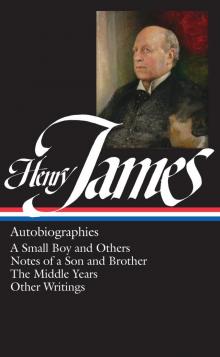 Henry James
Henry James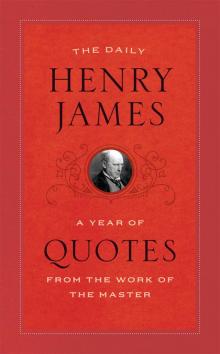 The Daily Henry James
The Daily Henry James Travels With Henry James
Travels With Henry James The Reverberator: A Novel
The Reverberator: A Novel What Maisie Knew (Henry James Collection)
What Maisie Knew (Henry James Collection)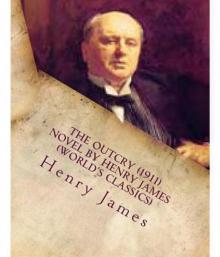 The Outcry
The Outcry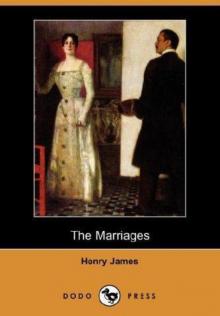 The Marriages
The Marriages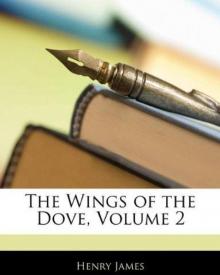 The Wings of the Dove, Volume 2
The Wings of the Dove, Volume 2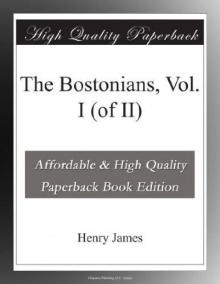 The Bostonians, Vol. I
The Bostonians, Vol. I The Outcry: -1911
The Outcry: -1911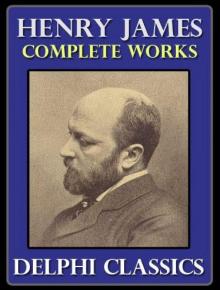 The Complete Works of Henry James
The Complete Works of Henry James Letters from the Palazzo Barbaro
Letters from the Palazzo Barbaro The Pupil
The Pupil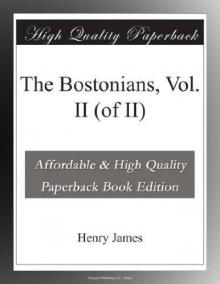 The Bostonians, Vol. II
The Bostonians, Vol. II Pandora
Pandora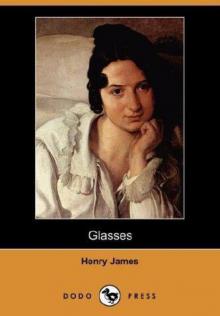 Glasses
Glasses The Princess Casamassima
The Princess Casamassima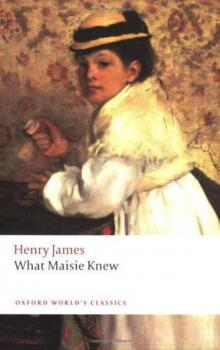 What Maisie Knew
What Maisie Knew The Reverberator
The Reverberator The Golden Bowl - Complete
The Golden Bowl - Complete Confidence
Confidence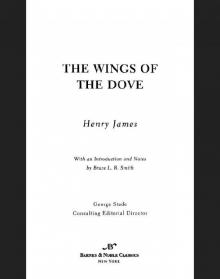 Wings of the Dove (Barnes & Noble Classics Series)
Wings of the Dove (Barnes & Noble Classics Series)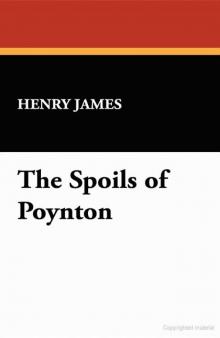 The Spoils of Poynton
The Spoils of Poynton